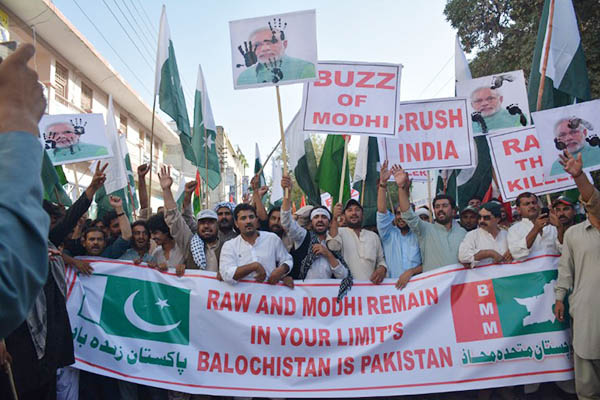
Banaras Khan—AFP
Pakistan’s greatest flaw lies in its regional isolationism.
On Aug. 25, a dozen motorbike-riding terrorists killed a local land-revenue officer in Balochistan and the half-dozen armed levies guarding him. This happened 85 kilometers from Gwadar. The terrorists first occupied a checkpost and kidnapped the guards before stopping the officer and his party and firing a rocket at them.
Since no one has owned the attack, the Pakistani mind will focus on the Baloch separatists who see the federal government’s development of Gwadar as some sort of violation. In 2013, Pakistan contracted with China to upgrade the port. It soon became a part of China’s “economic corridor” through Pakistan, especially to carry Chinese imports, such as oil—which will land in Gwadar and be refined there—through Pakistan on the road-and-rail network being developed by it with an investment of $46 billion.
It is not only the Baloch separatists that Pakistan suspects of the latest killings. India has objected to the China-Pakistan Economic Corridor (CPEC) “because it passes through the disputed territory of Kashmir (Gilgit-Baltistan).” India, denied land transit by Pakistan for its trade to Afghanistan and Central Asia, has agreed with Iran to build Chabahar port on the Iranian coast as an alternative link to Afghanistan. Pakistan has arrested an Indian spy in Balochistan earlier this year as proof of India’s messing with the Baloch insurgency. India’s Prime Minister Narendra Modi stirred the pot further by suggesting Indian involvement in Balochistan, in his Independence Day speech.
It is strange that in our parts trade routes are seen as harbingers of war rather than peace and prosperity. Pakistan’s protest that India uses Afghanistan to harm Pakistan implies rejection of Chabahar and its Zaranj-Delaram highway to Afghanistan. The United States, given its “pivot” to the east against China, is seen as partnering India in its anti-Pakistan strategy. The flaw lies in Pakistan’s isolationism in this regard because China, already invested big in India, Iran and Afghanistan, doesn’t go along with Pakistan’s worldview.

3 comments
Pakistan has a primitive view. Either with us or with them. This is not the 21st century world view. We are not in 600 AD
Pakistan is ticking to its national interest in the region where all the major powers are at play. If Pakistan survives this, there is no stopping Pakistan to becoming the best in the comity of nations.
Banaras sahib! You should rather commend those at the helm for sticking tenaciously to the interests of Pakistan, even at the cost of so called ‘isolation’.